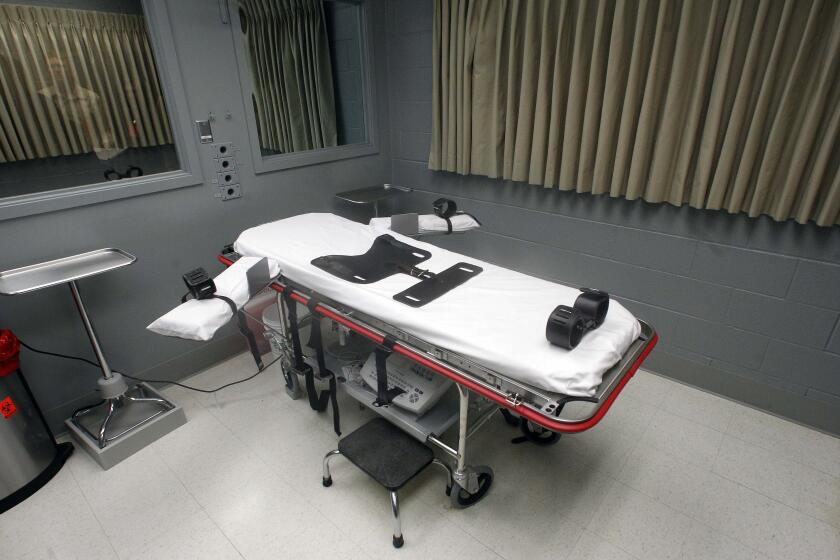Editorial: Bureaucracy of death may snag condemned Oklahoma man, guilty or not

Gentner Drummond isn’t one of those supposedly soft-on-crime, George Soros-supported prosecutors about whom conservative commentators and politicians like to complain. He’s Oklahoma’s Republican attorney general and a supporter of the death penalty.
So it’s a big deal that he called for clemency for Richard Glossip, who is scheduled to die by lethal injection on May 18.
For the record:
4:36 p.m. May 2, 2023An earlier version of this editorial incorrectly referred to Richard Branson as chief executive of Virgin Atlantic. His correct title is Founder, Virgin Group.
Several prominent Oklahoma Republican lawmakers have likewise argued for Glossip, horrified that their state is close to putting to death a man who may be innocent.
The state parole board considered clemency last week, but one of its members is married to the person who prosecuted Glossip, so he recused himself. That left the board deadlocked at 2 to 2.
Because the board was a vote short of recommending clemency, Gov. Kevin Stitt said he will do nothing to intervene.
Florida jurors and Oregon’s governor were unlikely heroes in the fight against executions last year. But elsewhere the death mill continues to grind.
Glossip is set to die for the 1997 murder of Barry Van Treese, owner of the Best Budget Inn in Oklahoma City.
Yet it’s universally acknowledged that Glossip, the motel manager, didn’t do it. No one argues that Glossip was even in the room when Van Treese was bludgeoned to death by maintenance worker Justin Sneed. No one questions Sneed’s confession. No one doubts that Sneed was rewarded with life in prison, instead of the death penalty, in exchange for blaming Glossip as the supposed mastermind. No one claims that Sneed is an honest man. And there is no meaningful evidence of Glossip’s guilt beyond Sneed’s testimony.
But the bureaucracy of death has a schedule to keep, and there are few places in the nation where that terrifyingly normal machinery moves more efficiently than Oklahoma. It began the year with 11 people on its execution docket, although the court granted Drummond’s request to slow the pace to allow prison officials more time between each one and to give them more time for training. Glossip is up next. Only Texas puts people to death at a faster clip.
Those impatient to keep the state’s killing on track correctly note that Glossip’s case has gummed up the works for decades, with ineffective counsel in violation of the 6th Amendment, and questions over the drugs that were to be used to kill him. The delays allowed time for more people to notice the serious questions about the facts of the case, not to mention the cruelty of Oklahoma’s lethal injection protocols. A host of famous people took up Glossip’s cause: Richard Branson, Founder, Virgin Group. Sister Helen Prejean, author of “Dead Man Walking.” Pope Francis, Susan Sarandon, Kim Kardashian.
Seeking to execute accused Buffalo mass killer Payton Gendron would be to answer moral repugnance with moral repugnance.
Houston law firm Reed Smith produced a scathing independent report showing withheld evidence and previously unreported conflicts of interest.
So far, none of it has been enough.
And if it’s not enough in a case that has had sufficient time and profile to attract widespread attention, what about the many other death sentences that are carried out in a more expeditious manner?
Credible investigations suggest that around 4% of people executed in the United States are innocent. Some of the wrongful killings are widely acknowledged after the fact.
A maxim put forth by 18th century English jurist William Blackstone holds that it’s better for 10 guilty men to go free than for one innocent man to suffer. Make that 100 guilty men, Benjamin Franklin said.
Did Richard Glossip hire or order Justin Sneed to kill their mutual boss, Barry Van Treese, 18 years ago in Oklahoma City?
Or was all that just liberal nonsense? Is it better, in Oklahoma and around the nation, to put a man to death despite serious questions about his guilt, than to see him — well, not go free. Just to continue to live in prison, perhaps long enough to be exonerated in old age, as numerous people, living under sentences of both life and death, have been.
Yes, the execution bureaucracy says, along with death penalty supporters. It’s better, in this cruel and bloodthirsty nation of equal justice under the law, to kill people now. We can always sort out the truth later.
More to Read
A cure for the common opinion
Get thought-provoking perspectives with our weekly newsletter.
You may occasionally receive promotional content from the Los Angeles Times.













